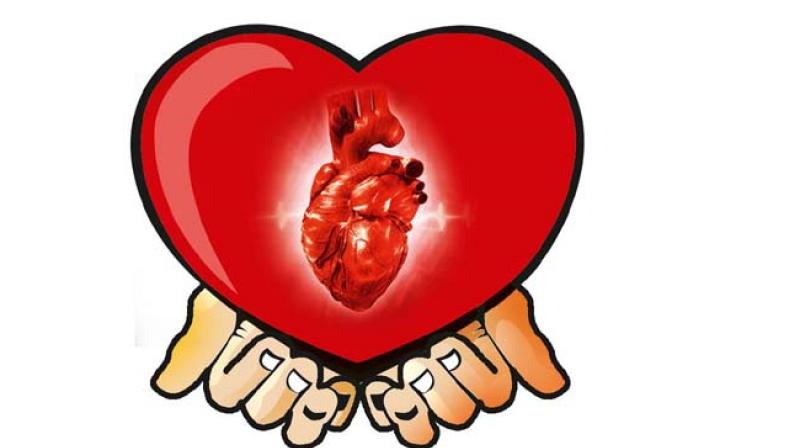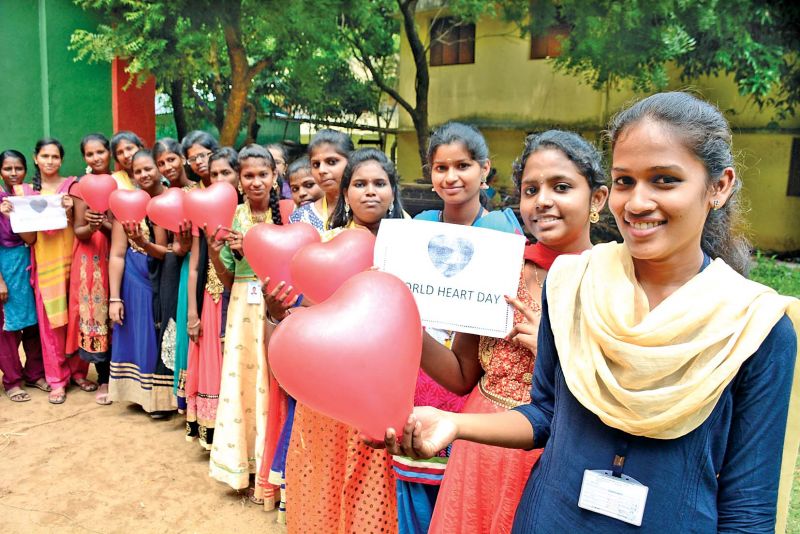Cardiovascular diseases: A leading cause of death
Cardiac disease are one of major causes of death and disability in the world.

Chennai: Even after increased awareness and developments in cardiology, cardiovascular diseases make up the largest proportion of all deaths from non-communicable diseases.
With increasing life style deviation, lack of balanced diet and spiking stress, heart diseases are ominously increasing with even youngsters in its grip.
Cardiac disease are one of major causes of death and disability in the world, killing 17.5 million people a year and over 23 million predicted deaths from cardiac diseases by 2030.
On World Heart Day themed “share the power”, heath experts emphasise on sharing how can an individual take actions to keep our hearts healthy and charged by lifestyle changes and other preventive measures.
“Prolonged working hours, hectic commute and growing incidence of obesity along with sedentary lifestyle are also one of the reasons for population to be more prone to heart ailments,” said Dr Kirti Chadha, Head, Metropolis Healthcare. As there are no substantial symptoms, a thorough check up of cholesterol levels is of utmost importance to keep a track of good health, she added.
The mean age of heart failure patients in India is 59 years, which is approximately 10 years younger than patients in US and Europe, a study by International Congestive Heart Failure reveals.
“Smoking and drinking alcohol is a part of youth lifestyle but it is a huge risk factor for heart attacks, and those wanting a healthy heart should stop such habits completely. Fast food, deeply fried food and canned food are consumed by youngsters on a daily basis but they lead to many cardiac disorders,” said Dr P. Jayapandian, consultant cardiologist at Meenakshi Mission Hospital, Madurai.
Health experts say that heart diseases and numerous other non-communicable diseases can be prevented by regular physical activity. “Usually youngsters skip sports activities once they complete their schooling, which is extremely bad for heart health. A regular physical activity for an hour on a daily basis can help avoid obesity and keep away cardiac diseases,” said Dr Madan Mohan, senior cardiologist at Fortis Malar.
Dr Vijay Kumar, VHF, Vijaya Hospital
We are in the midst of a true global cardiovascular disease (CVD) epidemic. CVD includes coronary heart diseases (heart attack, angina, coronary death), cerebrovascular diseases (paralytic stroke), peripheral vascular diseases, congestive heart failure, hypertension, valvular and congenital heart disease.
Coronary artery diseases form the bulk of CVD epidemic. Both Framingham and inter-heart study demonstrated that 90 per cent attributable risk is due to tobacco, smoking, hypertension, diabetes, high lipids, physical inactivity, abdominal obesity, high-risk diet, etc.
 Students from Kumara Rani Meena Muthiah College on Thursday undertake a pledge to create awareness on heart diseases to mark the World Heart Day. (Photo: DC)
Students from Kumara Rani Meena Muthiah College on Thursday undertake a pledge to create awareness on heart diseases to mark the World Heart Day. (Photo: DC)
The global burden of disease study 2016 clearly documented that cardiovascular disease contribute to 30 per cent deaths in men, 20 per cent in women compared to 18 per cent in men and 16 per cent in women in 1995 in India.
What is feasible & possible
- Every hospital to screen patients coming for anything, for smoking, BP, sugar, cholesterol and if needed for heart disease. Facilities for educating with behavioural intervention and medical intervention.
- Simplified accessible well-displayed evidence based guidelines and flow charts to prevent medicalisation of asymptomatic individuals.
- School educational programmes and mass screening camps.
Genomics to aid at-risk cardiac patients
Genomics can play a key role in all aspects of cardiovascular disease and treatment in the near future, say health experts. Given the value of early risk assessment, genetic markers for conditions such as cardiomyopathy, hypercholesterolemia, atrial fibrillation, sudden cardiac arrest and other conditions that can be routinely assessed in the general as well as at-risk populations. “In the coming years, integration of genetics in risk assessment, management, and prevention of cardiac diseases is anticipated to surge. At-risk patients at various stages of the disease and families can be aided and treatment can be improved,” explains Dr. Abdur Rub, Xcode Life Sciences.
Heart failure turns silent killer, say docs
Among various cardiac diseases, heart failure has emerged as the biggest silent killer accounting for 46 per cent mortality due to cardiac reasons, the second largest in the world, as per a recent study published in Lancet.
Heart failure is a life-threatening condition where the heart cannot pump enough blood around the body.
The alarming symptoms include shortness of breath, swelling in the ankles, legs and abdomen, rapid heartbeat, said Dr Immaneni Sathyamurthy, cardiologist, Apollo Hospitals.
According to health experts, heart failures are often ignored in preliminary stages leading to silent death after ultimate heart failure.
Doctors say that risk factors for heart failure include a history of coronary artery disease (CAD), heart attack, high blood pressure, diabetes, obesity, heart valve disease, and family history of heart diseases, say doctors.
“With the burden of heart failure surging in India and the associated high death rates, it is necessary to prioritise heart failure as a cardiovascular disease.
The need of the hour is to develop a community level approach to raise awareness about this condition, which is often used interchangeably with heart attack, or seen as an aftermath of heart attack,” said Dr Shirish Hiremath, President, Cardiological Society of India.
Campaign on heart failure awareness
#Takeittoheart, a mass awareness campaign to highlight on heart failure and its various stages has been launched by Gleneagles Global Hospitals. The campaign urges people to take heart failure seriously and how it can be treated through medical intervention.
“Considering the growing incidence and higher morbidity of heart failure patients compared to other countries, there is need for dedicated heart failure programs that provide end-to-end and comprehensive treatment modalities,” said Dr Jagprag Singh Gujral, Group COO, Gleneagles Global Hospitals.

